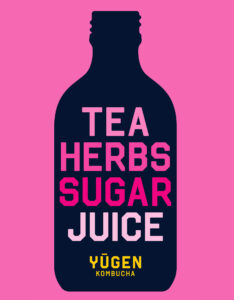
If you have no idea what pasteurisation is and why the difference between pasteurised and unpasteurised kombucha matters; don’t worry, we’ll explain! Discover as well why Yugen commits to unpasteurised kombucha and why it always should be stored in the fridge.

The History of Kombucha and Pasteurisation
Let’s start at the beginning.
Raw, unpasteurised kombucha has been around for a long time. Many of the oldest records go as far back as 221 B.C. in Eastern Asia. Ever since then, generations have passed kombucha on by sharing scobies. Scobies (Symbiotic Cultures of Bacteria and Yeast) are the living organisms necessary to ferment the tea. During the fermentation process, the yeasts and bacteria transform the sweetened tea into delicious kombucha. These living organisms define the drink and are at the root of its success throughout the ages. They are present in each raw kombucha and deliver added health benefits. Want to know about more the ancient history of kombucha? Read our blog here.

Yugen stays true.
Yugen believes in these health benefits that have been around for ages. We go to incredible lengths to present our customers a fresh and authentic kombucha, packed with naturally occurring beneficial bacteria. Putting a raw, unpasteurised kombucha on the market might not be the easiest method, but for us it’s the right way.
What is pasteurisation?
Louis Pasteur, the French scientist also known as "the father of microbiology", first proved that tiny organisms spoiled food, and people could prevent it with a controlled heat treatment. After the process, virtually no living cells remain. Thus, pasteurisation kills off any living microorganisms in food and beverages using heat treatment. Obviously killing of bad microorganisms is a great discovery, since the process greatly impacts the amount of food spoilage.
Before the invention of pasteurisation and refrigeration, cultures across the world relied on fermentation to preserve their precious foods. The byproducts of fermentation such as, lactic acid, acetic acid, carbon dioxide, or alcohol prevent rapid spoilage, and thus enabled them to survive more difficult times. The same processes apply to kombucha where the low pH created by fermentation acts as a natural preservative.
However, without proper refrigeration, kombucha with left over sugar will continue to ferment and the flavour will change. More carbon dioxide will be produced and the drink will become more tart and more alcoholic. So even though kombucha is inherently protected from spoilage because of the fermentation, you still need refrigeration to preserve the quality.
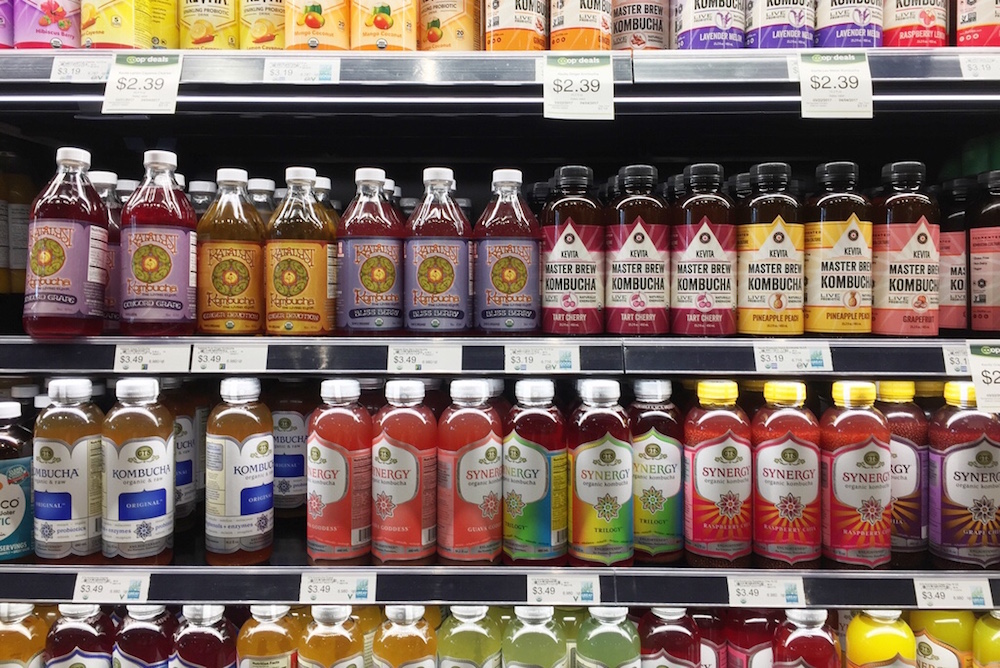
Because of this, some sugar containing kombucha brands opt to pasteurise their product. The pasteurisation process allows them to produce a fully shelf stable kombucha. In other words, pasteurised kombucha does not need refrigeration, not in the store, not during transportation and not at home. This obviously simplifies the logistics and also lengthens the shelf life.
The Consequences of Pasteurisation and Choosing Your Kombucha
Great! So why not pasteurise?
The first and most obvious consequence of pasteurisation is that there are no more beneficial microorganisms active in the drink. Most kombucha lovers tend to enjoy their booch raw because of the potential health benefits they provide. Together with the University of Ghent, Yugen researched the amount of living cells in our kombucha. We found that every bottle or can contains as much as 3 billion living cells. The live cultures in fermented foods can help restore the balance of friendly bacteria in your gut and may alleviate some digestive problems.
The second, more subtle consequence is that pasteurisation also has a small but measurable effect on the flavour and aroma. It takes the edge of raw kombucha. The different flavours and aromas that characterise the drink become a bit less pronounced because of the loss of the volatile aromas.
The third consequence is that the heat process also decreases the amount of nutrients like vitamin C. Since we pack every Yugen flavour with fresh pure juice, this would greatly impact its nutritional value.

So how do I know which kombucha to choose?
Unfortunately there are no laws yet that enforce the correct labelling of pasteurised products, but most brands do put this on their label. Just look for signs that say "raw", "unpasteurised", "store refrigerated", "cold storage", etc.
Whenever you find a sugar containing kombucha on the ambient shelf outside of the refrigerator, you can assume it has been pasteurised. Otherwise it would keep fermenting and create a big kombucha volcano mess. This does not apply to sugar-free kombucha's. The lack of sugar makes these inherently stable.
If you want your kombucha to be fresh and packed with beneficial life, make sure to either check the label or buy one that’s stored in the fridge. Unpasteurised kombucha for the win!

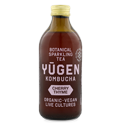 I like Yugen Kombucha
I like Yugen Kombucha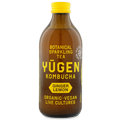
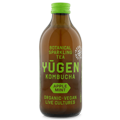 J'adore Yugen Kombucha
J'adore Yugen Kombucha


